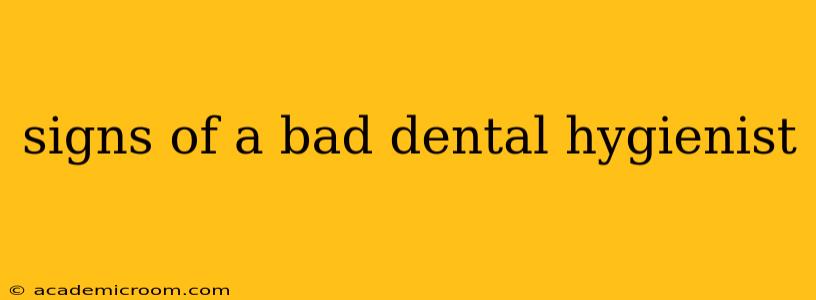Maintaining optimal oral hygiene is crucial for overall well-being, and a skilled dental hygienist plays a vital role in this process. However, encountering a poorly trained or unprofessional hygienist can lead to discomfort, ineffective cleaning, and even potential harm. This comprehensive guide will help you identify the red flags of a bad dental hygienist, enabling you to advocate for your oral health and find a provider you can trust.
What are the signs of a bad dental hygienist?
This is a multifaceted question, and the answer depends on several factors. A bad experience could stem from technical skill deficiencies, poor communication, a lack of professionalism, or disregard for hygiene standards. Let's delve into specific indicators.
My hygienist is causing me pain; is this normal?
Pain during a dental cleaning should never be considered normal. While some slight discomfort is possible, sharp, persistent, or unbearable pain is a major red flag. A skilled hygienist will use gentle techniques and adjust their approach if you express discomfort. If your hygienist continues despite your protests, it's a serious warning sign. Report the pain immediately and consider seeking a second opinion.
My hygienist doesn't explain the procedures; is this a problem?
A lack of communication is a significant issue. A good dental hygienist will clearly explain each procedure, answer your questions, and address any concerns you may have. They should explain the importance of flossing, brushing techniques, and other aspects of oral hygiene. If your hygienist rushes through the cleaning without explanation or doesn't answer your questions, it suggests a lack of professionalism and patient care.
My hygienist seems rushed or uninterested; what should I do?
A rushed appointment often leads to incomplete cleaning and an increased risk of errors. A disinterested hygienist may not pay close attention to detail, potentially missing crucial issues with your oral health. A good hygienist will spend adequate time with each patient, paying attention to individual needs. If you feel rushed or ignored, consider switching hygienists.
Is it normal for my hygienist to be unsanitary?
Unsanitary practices are a serious concern. This includes neglecting proper sterilization techniques, failing to wear gloves, or maintaining an untidy workspace. A hygienist should always prioritize hygiene to prevent cross-contamination and the spread of infection. Report any unsanitary practices to the office manager or the dental board.
My hygienist isn't thorough; what does this mean?
A thorough cleaning is essential for preventing gum disease and other oral health problems. A lack of thoroughness could indicate insufficient training or a lack of attention to detail. If you feel your cleaning is incomplete or superficial, this is a sign you should seek a second opinion.
My hygienist is consistently late; is this acceptable?
Consistent lateness is unprofessional and disrespects your time. It may indicate poor time management or an inability to handle a busy schedule. While occasional delays happen, frequent lateness is a valid reason to consider finding another hygienist.
How can I find a good dental hygienist?
Finding a good dental hygienist involves research and careful consideration. Ask for recommendations from friends, family, or your dentist. Online reviews can also provide valuable insights into other patients’ experiences. Look for hygienists with certifications and a history of positive feedback. Schedule a consultation to assess their communication style and level of comfort. Trust your gut – if something doesn’t feel right, don’t hesitate to seek a different provider.
Remember, your oral health is paramount. Don’t hesitate to advocate for yourself and find a dental hygienist who meets your needs and provides exceptional care. A good relationship with your hygienist is key to maintaining a healthy and beautiful smile for years to come.
